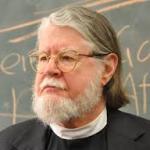My Trickle-down Theory of Ideas and Practices
Several readers have asked me about the relevance of theology as I have written this series of essays about revolutions in modern theology.
”The trickle-down effect” is a phrase usually used with regard to economics. It is the belief that if the rich get richer that will benefit even the poor. “A rising tide lifts all boats.” US president Ronald Reagan used the phrase to support his policy of cutting taxes of the rich. Then candidate George H. W. Bush called it “voodoo economics.” Then Bush changed his mind when Reagan called him to be his vice presidential candidate.
I adopted the phrase to describe how seemingly abstract theological ideas in Christian history have effects on even the uneducated sitters-in-the-pews of churches. The cascade of cause and effect begins, usually, in the universities. Then it trickles down into the colleges and seminaries. Then it trickles down into the popular writers and preachers and their books and sermons. Then it lands in the minds of lay Christians (some educated, some not educated beyond high school).
Often an idea formed in the mind of an “ivory tower” theologian or philosopher loses something in the translation, the trickle down. But even so it often makes a difference in how many people in a certain denomination or tradition think.
I will dare to claim that I experienced a kind of trickle-down effect in my own early Pentecostal upbringing and education. I was taught that the experience of speaking in an unknown “tongue” (language) was the necessary “initial, physical evidence” of the experience of being filled with the Holy Spirit (subsequent to conversion).
Later, while studying the Enlightenment and scientific revolutions I discovered the source of that idea. There must be a physical evidence, an observable evidence, of any peak experience that is claimed as necessary. This was, of course, a secular notion, but it somehow trickled down even into a Christian tradition that rejected secularity. Most Pentecostals have never recognized the doctrine’s roots. It’s rise among Pentecostals in the early 20th century was unconscious, as to its roots and causes.
I could give numerous examples of my trickle-down theory of theology, examples of cases in which seemingly very abstract, “lofty” ideas eventually made an impact on people who would never hear of or study the philosopher or theologian who launched the idea.
I once visited a large Methodist church whose pastor preached a sermon that was, as I recognized, “pure Tillich.” The sermon was taken with very little change from a chapter of a book of Paul Tillich’s sermons.
Sometimes the ideas that trickle down into the pulpits and pews are good; sometimes they are bad. By “good” I mean helpful; by “bad” I mean pernicious.
So how do ideas affect practices? How one thinks about prayer is an example. Over the years I have heard this cliche numerous times, even from pulpits: “Prayer doesn’t change God; it changes me.” Or “prayer doesn’t change things; it changes me.” A close listening reveals that the speaker means that prayer has the purpose and potential effect of aligning the pray-er with the will of God but it can’t and doesn’t change anything in God’s will or God’s plans or actions.
The modern source of this idea of prayer is Friedrich Schleiermacher, the “father of modern theology,” the founder of liberal theology. In his systematic theology, which was used in many German theology classes, said that petitionary prayer is an immature form of prayer because it makes God dependent on the pray-er when, in fact, God is not dependent on anything or anyone for anything. The essence of religion, including Christianity, is the “feeling” (Gefuehl) of utter dependence on the universe or God.
Every time I hear or read that prayer doesn’t change anything outside the self I shudder, knowing its source and implications.
Also, Schleiermacher contradicted himself here. He taught that what was special about Jesus Christ was his perfect God-consciousness. But Jesus prayed petitionary prayers and taught his disciples to pray a specific one. Did Schleiermacher think Jesus’s spirituality was immature? That would contradict his Christology.
High, lofty, abstract theological ideas can and often do trickle down into the practices of “ordinary” Christians. It would be helpful for pastors to recognize them and help his or her congregants either to adopt them or turn away from them before they become habitual.
*Note: If you choose to comment, make sure your comment is relatively brief (no more than 100 words), on topic, addressed to me, civil and respectful (not hostile or argumentative) and devoid of pictures or links.*














